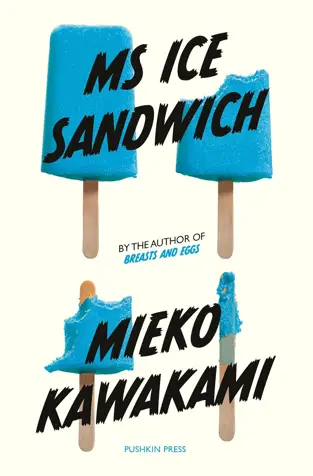Ms Ice Sandwich

At school the narrator has fun passing the day giving nicknames to students based on the sounds of their farts. Do-wop and Tutti are the lucky / unlucky beneficiaries of this christening. After a period of time the names stick and everyone uses them, including their teachers. The named bear no animus, especially after the narrator offers up apologies.
Meanwhile we learn the narrator has no father present at home, just his mum and an aging grandmother who has suffered a stroke, but can comprehend some communication. The narrator begins drawing pictures of Ms Ice Sandwich using different media: crayon, pencil, paint. He tells his grandmother of her in detail but has little face time with his mother due to her schedule conflicts.
The visits to the grocery continue and at one point a loud altercation breaks out between a disgruntled customer, who is no doubt put off by Ms Ice Sandwich’s stand-offish nature. During the encounter she simply stares back at him, showing no emotion. The narrator is duly impressed.
One day at school the narrator hears three girls making fun of the sandwich lady at the grocer, implying she had “work done” to her face and that if they looked like her they would prefer to be dead. This disturbs the narrator greatly, but he says nothing.
One day Tutti invites the narrator over to watch a movie with her father and her (her mother died when Tutti was very young). The movie they watch is Heat (1995) with De Niro and Pacino playing the leads. During the last gunfight, Tutti rewinds it excitedly, then hits play and re-enacts every part as it plays through a second time never missing a beat. She notes that she’s seen the movie hundreds of times. The narrator says to her that it is a bit violent. Tutti replies, whispering, no duh, it’s supposed to be.
Tutti accompanies the narrator partway home after the movie and the narrator says how impressed he is with Tutti’s choreographed gunfight re-enactment. The two strike an accord and have their own quiet re-enactment for fun.
Now (continuing their walk) he finally feels safe to broach the subject of what he overheard the girls at school saying about Ms Ice Sandwich with Tutti. Also, that he likes Ms Ice Sandwich as an interesting person whom he obviously perceives as cool. He’s more comfortable revealing his weird or unpopular opinion to Tutti after she has displayed her weird predilection to play-act gun fights to him.
At this point the pair begin speaking at a more mature / adult level than is perhaps believable, but the emotional impact of the story begins to hit home. Tutti convinces the narrator that it sounds like he never wanted to see Ms Ice Sandwich again. Why? he asks. She goes on to challenge him to meet her again and strike up a conversation that is more than ordering a sandwich. “You can start with, nice to meet you, she says.
I’ll leave off there to not spoil things, but this short work hit home. _Ms Ice Sandwich_ is about how often we say, “See you later,” but sometimes (and ultimately) there is no later—whether it’s people moving, those you saw on a graduation day then lost touch of, or someone we otherwise lose touch of.
It’s also about new friendships.